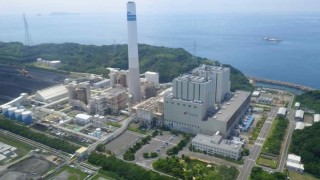Loading
Search
▼ Japan's Top Coal Power Company Scraps Plan For New Plant
- Category:Other
J-Power cites costs and global pushback for decision on Yamaguchi project
Japan's top coal power producer J-Power canceled the construction of a power plant in Yamaguchi Prefecture, the company said Friday, as it works to curb its dependence on the fossil fuel amid growing regulatory pressures.
"We have decided against construction upon considering the project's profitability," J-Power Director Hitoshi Kanno said. "We will take advantage of our existing facilities to curb carbon dioxide emissions with as little costs as possible."
J-Power had planned to install two 600-megawatt coal-fired facilities in the city of Ube with Japanese chemical manufacturer Ube Industries and Osaka Gas. Osaka Gas withdrew from the project in April 2019, saying it no longer believed it could recoup the investment.
J-Power and Ube had since downsized plans to a single 600-MW unit, and were considering using cutting-edge environmental equipment and other options to move forward with the project.
But coal, which is carbon-intensive even compared with other fossil fuels, has faced increasing headwinds as Japan and other leading economies ramp up their fight against climate change. Japan aims to achieve net-zero carbon emissions by 2050, and Prime Minister Yoshihide Suga is expected to discuss possible cooperation on climate in his summit with U.S. President Joe Biden on Friday.
As part of Japan's push to curb emissions and shut down inefficient facilities, the economy ministry plans to require all coal power plants to achieve an efficiency rate of 43% by 2030.
The current requirement is 44.3% across all types of thermal power, which includes less carbon-intensive alternatives like liquefied natural gas and petroleum. The Federation of Electric Power Companies of Japan believes achieving 43% is "an extremely ambitious goal" when it comes to coal.
Japan has roughly 150 coal-fired facilities nationwide. Among those operated by a major utility, just two met the threshold in fiscal 2019, while 31 scored an efficiency rate of 40% or above, according to the economy ministry.
Both new and existing plants would require massive investment to achieve the 43% goal. But this could be a risky move, since it usually takes at least 20 years before utilities start earning returns on coal power plants, and Japan could adopt even tougher restrictions on the fuel in the meantime.
"We are seeing pushback against coal across the world, which contributed to our decision" to cancel the new plant, Kanno said.
Japan's top coal power producer J-Power canceled the construction of a power plant in Yamaguchi Prefecture, the company said Friday, as it works to curb its dependence on the fossil fuel amid growing regulatory pressures.
"We have decided against construction upon considering the project's profitability," J-Power Director Hitoshi Kanno said. "We will take advantage of our existing facilities to curb carbon dioxide emissions with as little costs as possible."
J-Power had planned to install two 600-megawatt coal-fired facilities in the city of Ube with Japanese chemical manufacturer Ube Industries and Osaka Gas. Osaka Gas withdrew from the project in April 2019, saying it no longer believed it could recoup the investment.
J-Power and Ube had since downsized plans to a single 600-MW unit, and were considering using cutting-edge environmental equipment and other options to move forward with the project.
But coal, which is carbon-intensive even compared with other fossil fuels, has faced increasing headwinds as Japan and other leading economies ramp up their fight against climate change. Japan aims to achieve net-zero carbon emissions by 2050, and Prime Minister Yoshihide Suga is expected to discuss possible cooperation on climate in his summit with U.S. President Joe Biden on Friday.
As part of Japan's push to curb emissions and shut down inefficient facilities, the economy ministry plans to require all coal power plants to achieve an efficiency rate of 43% by 2030.
The current requirement is 44.3% across all types of thermal power, which includes less carbon-intensive alternatives like liquefied natural gas and petroleum. The Federation of Electric Power Companies of Japan believes achieving 43% is "an extremely ambitious goal" when it comes to coal.
Japan has roughly 150 coal-fired facilities nationwide. Among those operated by a major utility, just two met the threshold in fiscal 2019, while 31 scored an efficiency rate of 40% or above, according to the economy ministry.
Both new and existing plants would require massive investment to achieve the 43% goal. But this could be a risky move, since it usually takes at least 20 years before utilities start earning returns on coal power plants, and Japan could adopt even tougher restrictions on the fuel in the meantime.
"We are seeing pushback against coal across the world, which contributed to our decision" to cancel the new plant, Kanno said.
- April 16, 2021
- Comment (0)
- Trackback(0)


